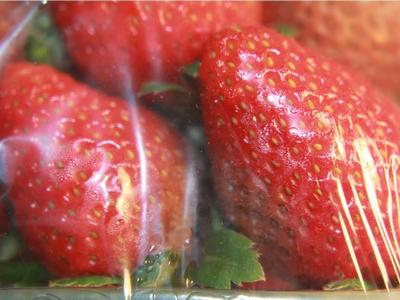
SAO PAULO, Brazil, February 13, 2021 (ENS) – A plastic film that can deactivate 99.99 percent of the virus that causes COVID-19 in 15 minutes has been released by an international team of companies and universities from Brazil and Spain. The product, AlpFilm Protect PVC, is now on the market and is being used to pack meat, fruit, vegetables and cold meats, and to protect surfaces.
The scientific team found that silica is a semiconductor that becomes active with metallic silver nanoparticles to generate oxidative molecules capable of deactivating 79.9 percent of the new coronavirus in three minutes and 99.99 percent in just 15 minutes.
The scientists highlight the oxidative capacity of these nanoparticles to destroy the outer lipid layer of the coronavirus and thus prevent the adhesion and proliferation of the virus on the surface of materials.

The scientific team behind this innovative plastic film is made up of three companies – Braskem, AlpFilm and Nanox – and two universities – the Federal University of São Carlos in Brazil and Universidad Jaume I of Castellón in Spain.
A scientific collaboration that started 15 years ago between the two universities and Nanox had yielded a product with antifungal and bactericidal properties back in in 2014 – a transparent polyvinyl chloride, PVC, film suffused with silver microparticles.
That plastic film they developed six years ago has now become marketable anti-viral technology patented by Nanox, with the support of the vinyl application engineering team of Braskem, the largest petrochemical company in Latin America, and AlpFilm, a Brazilian family company that is one of the main manufacturers of PVC plastic films in Brazil.
The team was inspired by the urgent needs of the pandemic to rethink their antifungal and bactericidal PVC film to see if it could be reconfigured to protect against SARS-CoV-2, the virus that causes the disease COVID-19.
“The product existed since 2014 with antifungal and bactericidal properties thanks to the presence of silver microparticles,” explains Alessandra Zambaldi, AlpFilm’s director of foreign trade and marketing, “but with the pandemic, we subjected it to a series of studies to adapt its composition in order to ensure its antiviral efficiency. ”
“Faced with the challenges imposed by COVID-19, we decided to focus our attention on researching and developing this product evolution to deactivate the new coronavirus by contact,” Zambaldi said.
The tests to verify the power of the new plastic packaging to suppress SARS-CoV-2 were conducted at the level 3 biosecurity laboratory of the Institute of Biomedical Sciences of the University of Sao Paulo in compliance with the technical standard for measuring the antiviral activity in plastics and other non-porous surfaces.
Scientists with Braskem and AlpFilm improved the film’s formula, maximizing its protection potential against fungi, bacteria, and viruses.
“Plastic has been a great ally against the coronavirus pandemic,” said Almir Cotias, vinyls director at Braskem Business. He manages the department responsible for the production of the raw material for the PVC film AlpFilm Protecto. “PVC solutions enable the production of a series of essential products ranging from medical and hospital products to packages, which ensure food safety, hygiene and cleanliness, among other factors, bolstering the fight against COVID-19.”
Anti-Viral Masks
Nanox Tecnologia, a spin-off from Brazil’s Centre for Development of Functional Materials, CDMF, in April launched a respiratory mask with bactericidal, antifungal and antiviral properties from the addition of silver and silica nanoparticles to the smooth, flexible polymer of which it is made.

The product, called OTO, is an alternative to the N-95 masks used by health professionals in hospitals. OTO’s rubber-like material can be shaped to the contour of the face, with silica and silver nanoparticles incorporated into the surface of the material for anti-viral protection.
Developed by an international research team from Brazil and Spain, it has the advantage of being reusable after being disinfected with soap and water. To protect the respiratory tract, this mask has two disposable PFF2 filters.
To prevent waste, the amount of material needed to produce the disposable filters is less than that used in the production of conventional masks, explains Luiz Gustavo Pagotto Simoes, director of Nanox at the Sao Paulo Research Foundation in Brazil.
“Silver and silica nanoparticles increase the level of protection by preventing the presence of fungi and bacteria in the mask,” Simoes said.
And Anti-Viral Fabric, Too
Nanox, with the support of the São Paulo Research Foundation’s program focused on innovative research in small enterprises, has developed a fabric with silver microparticles on its surface that can inactivate the SARS-CoV-2 virus.
In laboratory tests, this material eliminated 99.9 percent of the virus after two minutes of contact.
This virus-killing fabric is a mixture of polyester and cotton and contains two types of silver microparticles that penetrate its surface through an immersion, drying and fixing process. Nanox has already registered its patent application for the innovative material.
Simoes says, “We have established agreements with companies and factories in the textile, plastic and polymer sectors that will use this material for producing and marketing protective masks and hospital clothing.”
The anti-viral material was developed by researchers from the Institute of Biomedical Sciences of the University of São Paulo, the Laboratory of Theoretical and Computational Chemistry of the Universitat Jaume I, and the CDMF with the support of the São Paulo Research Foundation.
Copyright Environment News Service (ENS) 2021. All rights reserved.
© 2021, Environment News Service. All rights reserved. Content may be quoted only with proper attribution and a direct link to the original article. Full reproduction is prohibited.
